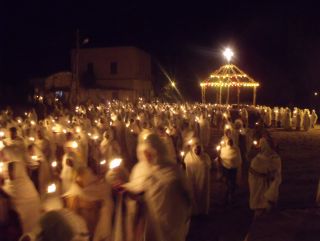Spirituality
One Way That Religious Belief Matters
The un-obvious benefits of costly rituals
Posted December 16, 2013
Evolutionary Puzzles

Evolutionary Puzzles
Although most religious people are disinclined to acknowledge how far-fetched at least some of their own tradition’s canonical beliefs sound, they rarely have any problems recognizing how strange the beliefs of other religious traditions seem. That religions routinely traffic in unusual and, otherwise, implausible counter-intuitive beliefs to which their participants subscribe is the first of the two most conspicuous puzzles religion poses for evolutionary theorists.
The second evolutionary puzzle is why individuals carry out costly behaviors and rituals that their religions demand. From fasting to celibacy to pilgrimages to tortuous initiations, religious participants make huge sacrifices of time, money, energy, and (sometimes) their reproductive prospects, because their religions mandate such conduct. In our own time what is, perhaps, the most extreme manifestation of such costly behaviors has gained startling currency, namely, suicidal acts of aggression against out-group members. Such costly acts are not confined to individuals. Religious groups erect monuments, carry out massive collective rituals, and, plenty of times in human history, go to war in the names of their gods.
Who Benefits?
When faced with structures, systems, or behaviors that seem so contrary to an organism’s interests, a standard question evolutionary theorists raise is cui bono?—who benefits? When patterns persist for millennia involving people expending so much time and energy on activities that deplete their resources and deflect them either from effective behaviors or causal understandings, someone must be profiting.
A standard strategy for dealing with this question when expensive behaviors have no obvious functions is to look for unobvious benefits. One common approach, at least since Durkheim, is to explore the advantages of such behaviors for the group as opposed to or as well as those for the individual. This raises the question of whether religious groups overall benefit from participants’ subscription to implausible beliefs and pursuit of costly behaviors.
The University of Connecticut anthropologist, Richard Sosis, and his colleagues have carried out wide ranging research that supports this contention with regard to costly activities, at least. Several of their findings suggest that religious groups prosper when members carry out frequent, collective rituals, in particular.
Religious Versus Secular Utopians
Sosis and Bradley Ruffle devised an experimental task that was a common-resource pool dilemma. Each of two players could take money from a pool of money, the total size of which they both knew. What they did not know was how much their playing partner withdrew. They also knew that if their joint withdrawals exceeded the pool’s total, then neither of them would receive anything, whereas if their joint withdrawals were equal to or less than the pool’s total, then they both would keep their withdrawals and any money remaining in the pool would be increased by 50% and divided equally between them. The researchers studied men and women in religious and secular kibbutzim in Israel.
What they found was that rates of participation in time-consuming, collective rituals—specifically, males praying communally three times daily in the religious kibbutzim—influenced cooperation in the task. Overall participants in the religious kibbutzim were significantly more cooperative in the experimental task than participants in the secular kibbutzim; however, the male ritual participants were completely responsible for the effect. Although females in religious kibbutzim carry out plenty of rituals as well, they are not involved in remotely as many collective rituals.
Sosis and Candace Alacorta’s study of 83 communes in nineteenth century America further corroborated the importance of religions making costly demands on participants’ behavior. This study showed that the religious communes survived significantly longer than the secular ones and imposed more than double the number of costly demands on participants’ conduct compared to the secular ones. Crucially, how long the religious communes persisted was positively correlated with the comparative number of costly demands that they imposed on participants.
A Role for Religious Belief?
But what about the other evolutionary puzzle? What about those otherwise implausible, counterintuitive religious beliefs? Did these studies offer any evidence suggesting that they might play a role in the relative success of these groups? One additional finding of the study of the nineteenth century communes suggests that they do. Even though many of the secular communes had larger numbers of costly demands on participants than many of the religious communes, those requirements had no relationship with the secular communes’ longevity. Apparently, it matters that God demands these privations and that he is watching to make sure that they are carried out.


